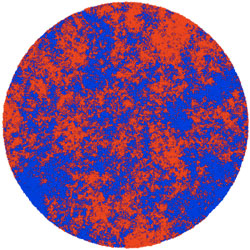Probability and Statistics

Internal DLA in $\mathbb{Z}^2$ with early points colored red and late points colored blue (taken from Logarithmic functions for internal DLA by Jerison, Levine, and Sheffield).
“Probability is both a fundamental way of viewing the world, and a core mathematical discipline, alongside geometry, algebra, and analysis.” Many of the leading probabilists of the twentieth century worked at Cornell, including M. Kac, W. Feller, G. Hunt, F. Spitzer, H. Kesten, K. Ito, and E. Dynkin. Today the research interests of the probability group center around random walks on groups, Dirichlet forms, potential theory, statistical physics and abelian networks.
Mathematical statistics concerns the logical arguments underlying justification of statistical methods and inference. Changes in technology are creating an exponential increase in the amount of data available to science and business, but the size and complexity of modern data sets require new mathematical theory. Cornell's mathematical statistics dates back to 1951 with the arrival of J. Wolfowitz, joined by J. Kiefer a year later. Current interests of the mathematical statistics faculty include the theory of statistical experiments (using the concepts of local asymptotic normality and of Le Cam equivalence), quantum statistics, statistical model selection, dimension reduction, high dimensional data (high dimension and small sample size) and empirical process theory.
Notable graduate students who pursued an academic career in probability and statistics include: Henry Lewis Rietz (1902), the first president of the Institute for Mathematical Statistics; Robert Cameron (1932); Murray Rosenblatt (1949); Daniel Ray (1953); Robert M. Blumenthal (1956); Harry Kesten (1958); Lawrence Brown (1964).
Field Members
Emeritus and Other Faculty
Activities and Resources
Activities are organized in collaboration with the departments of ORIE and Statistics, the graduate fields of statistics and applied mathematics, and the Center for Applied Mathematics.
- Probability Seminar
- Statistics Seminar
- Probability Summer School
- Probability in the Department of Mathematics at Cornell: a brief history
- A brief history of statistics at Cornell
- Department of Statistical Sciences
- NSF report of current and emerging research opportunities in probability (source of the quote in the first sentence)